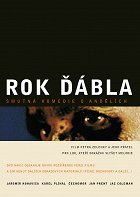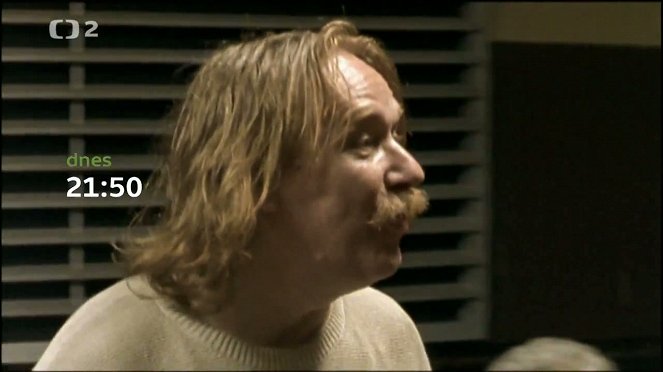Réalisation:
Petr ZelenkaScénario:
Petr ZelenkaPhotographie:
Miro GáborActeurs·trices:
Jaromír Nohavica, František Černý, Jan Prent, Václav Glazar, Jan Tříska, Jan P. Muchow, Jan Hřebejk, Saša Gedeon, David Černý, Karel Plíhal (plus)Résumés(1)
In Year of the Devil a Czech folk star, a band of funeral musicians, and a Dutch filmmaker stumble towards enlightenment on a remarkable musical tour. Writer/director Petr Zelenka fuses fact and fiction in a music-filled, magical adventure that has ghosts and guardian angels helping people hear the melodies within them. When the folk star approaches the band asking them to perform with him, he thinks they will help cure his friend Karel Plíhal. They think he will help them become famous, and the filmmaker thinks he has found a subject for a film. Naturally they are all right, but all of them get more than they bargained for. (texte officiel du distributeur)
(plus)Critiques (4)
Avant de regarder ce film, Jarek Nohavica était pour moi un terme inconnu. Après la fin du film, j'étais un peu confus, mais en même temps, une aura de mystère et de charme s'est formée autour de Nohavica pour moi. Et maintenant, j'ai hâte d'avoir un jour l'occasion de lui faire par exemple une interview. Peu importe qui il est en réalité, je ne pourrai jamais le percevoir indépendamment des sentiments que ce beau film m'a fait ressentir à son sujet.
()
Il a fallu que j'aille jusqu'à Dresde en 2024 pour voir ce film tchèque de 2002 :-D Ça fait sens et ça devait être mon destin. L'expérience a été d'autant plus marquante que j'ai pu voir Rok ďábla dans un petit cinéma situé dans une ancienne usine, un exemple de projet que nous connaissons aussi chez nous en Tchéquie, par exemple à Ostrava ou à Zlín. J'ai eu l'heureuse surprise d'apprendre que ce cinéma organisait une fois par mois des « mercredis du film tchèque » où des films de notre pays sont projetés, et c'est ce qui m'a donné la chance de voir Rok ďábla. Je me suis rendu compte que des œuvres de Petr Zelenka, il n'y avait que ses deux semi/pseudo documentaires musicaux que je n'avais pas vus. Les spectateurs allemands riaient bruyamment et je riais avec eux. Pourtant, l'humour parfois absurde n'est pas toujours facile à capturer dans la traduction. Les chansons entraînantes de Nohavica, par contre, se passent de traduction. J'avoue mal connaître l'œuvre et la personnalité de Karel Plíhal, mais à en juger par ce film, il semble être une personne très étrange. Difficile, cependant, d'évaluer ce qui est fiction et ce qui est réalité à son sujet, et j'ai pu confirmer à ma collègue allemande que Plíhal vivait toujours et que la combustion spontanée et les funérailles étaient fictives.
()
Wonderful mystification, in which a great amount of work is done by the music and sensitivity with which Zelenka plays out real characters in a fictional game full of great jokes and impressive poetics. Plíhal as a silent angel, Nohavica as an uncommunicative guru, and Čechomor as boys on the rise. When viewed from a distance, in some parts one might think that Zelenka is quite the clairvoyant prophet. He’s simply good at working with this genre.
()
In the end, I'll give it 3 stars, but just barely. I expected that Year of the Devil would have a much stronger and more compact impact. Especially because I had a good experience with Zelenka's mystifying quasi-documentary Happy End in the past. I'm thinking about what disturbs me so much and it's probably the celebrity dimension of the film. Nohavica, Plíhal, and the band Čechomor are essentially playing themselves and there are a number of Nohavica's actual songs in there. The film is actually relying on Nohavica's popularity and stealing his real lyrics. A good mystification utilizes some popular phenomenon, but it's not literal. I consider the British film The Rutles to be a very good example, as it made fun of Beatlemania. Year of the Devil does have funny moments and entertaining scenes, but I lost interest in the film during several passages. And to return to the celebrity aspect of the film, it's quite characteristic that Jan Hřebejk or Saša Gedeon appear in the credits, even though they only appeared for a few seconds as themselves. Nohavica also had a somewhat disturbing effect on me, as he suits the role of an "actor" much worse than the guys from Čechomor. Overall impression: 50%.
()

